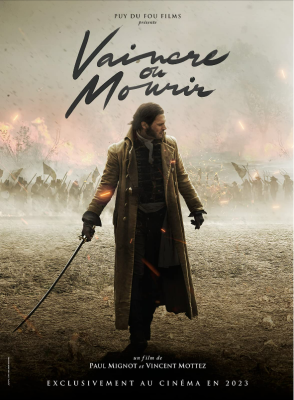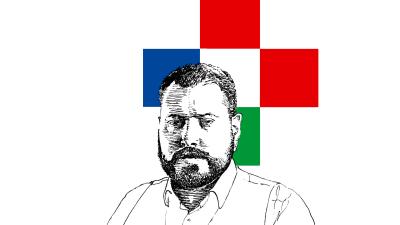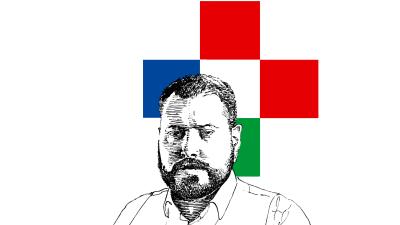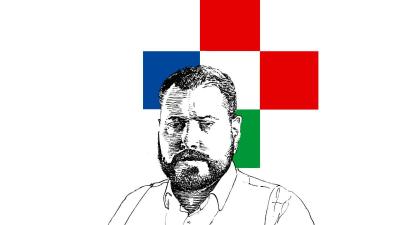French cinema, like many others, had its heyday in the 1960s and 70s. Since then, while great directors have produced some notable works, French cinema as a whole has clearly been not as rich and bright as in the past. The stars have faded and even the big budgets no longer guarantee any quality, either in content or in form.
One of the reasons for this artistic stagnation in the French cinema is the total domination of the progressive, woke, politically correct ideology, which systematically transforms each film, at least in part, into a work of propaganda in favour of the Western canons of the moment. All this clashes with artistic freedom, higher moral values and a dreamlike ambience. Nothing of what used to give a film its French charm shines through in contemporary films. Gone are the flirtatious antics of Belmondo, the virile charm of Delon or the irresistible suavity of Bardot. Gone are the kings of France, the Napoleons, the knights and ladies, the heroes of the “furia francese”. On the contrary, pettiness is highlighted, the “franchouillards” are denigrated, everything is subject to mockery, the art and beauty of the complex and rich history of France are only occasionally used as supports for anachronistic stories aimed at spreading anti-French and anti-European poison.
And then, while comedies in favour of multiculturalism follow one another thanks to the millions of euros of public money injected to support this cultural revolution, a low-budget film has been making headlines in France since January 2023. “Vaincre ou mourir”, made with barely 5 million euros, has surprised the entire Parisian elites because it tells the story of François Athanase Charette de La Contrie, known as “Charrette”. Before getting to the heart of the matter, let's make one thing clear. No, this is not a great film. Although made for the big screen, it feels like a TV movie. It is sometimes difficult to understand what the characters are saying and at times you don't fully understand the director's bias in making certain camera moves. Apart from that, my main criticism concerns the uniforms and the movement of military troops. But my keen eye for the Napoleonic military history perhaps gives this element more importance than it really has.
Could it be for these reasons that the whole of the French press, with the exception of a few independent right-wing media, has fallen on him with a vengeance? Not every mediocre or bad film triggers such ire from the mainstream press. But then, what is the problem for the Republican press? It's very simple: Charrette is a royalist and counter-revolutionary hero who led the Vendée peasants into battle from 1793 to 1796, in the name of Catholic and royal France. Horror! How can you praise an anti-republican monarchist?
Moreover, the film goes further: it denounces the crimes of the young French Republic, whether it be the infernal columns that killed 40,000 civilians, or Jean-Baptiste Carrier's drownings in Nantes, which killed between 1,800 and 5,000 people - refractory priests, prisoners of war, or ordinary civilians, men and women, and even children, who were simply suspects in the eyes of the Republic.
Without concession, without angelism or moralistic romanticism, the film follows the tragic epic of Charrette and his army of peasants. And what they wanted much more than the return of the King was freedom, justice and the right to practice the Catholic religion - while the Terror wanted to change the habits and customs of the French by force and state terrorism. Charrette himself, played by a taciturn Hugo Becker, announces in the first few minutes that he is 'not a saint'. He is not cleared of his historically proven crimes, which are otherwise depicted in the film. He is a man whom events alone rather than loyalty to the crown have led to join the insurrection. He is fickle and unfaithful. In short, Charrette is shown as he is, a man who is ultimately ordinary but caught up in history, and who ends up covering himself in eternal glory by his sacrifice for something "beyond him", as his character says in the film.
In this, the narrative arc and the hero’s evolution are refreshing: no guilt, no Manicheism, but the beauty of a truly human tragedy. Sacrifice for a cause, greatness of spirit, loyalty, courage, honour, the value of one's word, a sense of duty, camaraderie... This long list of values gives the film a particular flavour, which erases all its technical faults, so much so that it nourishes the soul. The audience, at the end of the film, applauds. The emotion was there, and you realise you have seen something special. A breach has been opened in the progressive empire of subsidised French cinema.
At the end of January, the film came seventh at the box office after having achieved over 100,000 viewers in its first week of its release, and by mid-February had accumulated almost 260,000 viewers. All this despite being shunned by cinemas, with 188 cinemas only offering it to the public. There was no advertising on the major channels and the newspapers only attacked it. For the far-left MP Alexis Corbière, this film is nothing less than a "reactionary offensive" and the fact that it talks about the unknown crimes of the French Republic is a "desire to erase"! The same left that keeps demanding repentance of France and the Republic for colonisation, Vichy or the Algerian war is up in arms when a modest film deals with a small part of the crimes of the Terror, a period of the Revolution that is disputed even among the most ardent republicans. The Tartuffes are unmasked, which is one more merit of this work.
There is a lot of talk about UFOs at the moment, and this film is certainly one. But it is not intended to be a unique and isolated case. The Puy du Fou, the successful enterprise of the right-wing Catholic politician Philippe de Villiers, has made with this film the first attempt to change the face of the French cinema and launch a French cultural counter-revolution through the 7th art. Let us only hope that this laudable ambition does not end up as a terribly French story, like the Charrette's epic: in panache, certainly, but also in defeat. For the lovers of France behind this project, who have become the resistance fighters of the national cinema, they will also have to win or die.
Read also
The Trap of Legal Immigration
Since 2015, immigration has become a major issue in Central Europe where, since the fall of Soviet communism, it was rather emigration that was the main social phenomenon. However, since the famous "migrant crisis" along the Balkan route, a lot has changed. And the faces you see in the streets of Warsaw, Budapest, Prague and Bratislava are changing too.
Ferenc Almássy
Country Report: Hungary
Following the success of the first European CPAC in Budapest last year, the meeting of conservatives who gravitate towards the US Republicans was held again in Budapest at the beginning of May.
Ferenc Almássy
Is the end of private cars coming soon?
For better or worse, the car has revolutionised our way of life, drastically changing our relationship with space. I do not intend to take stock of this revolution here and now.














Comments (0)